In a previous post, I spoke about a simple static key remote and how to replicate its signal using a small python script and RfCat. As part of the work done there, I set out to write a small tool that should help with some of the tasks involved with this process.

Lets take a look at ooktools, how to use it and the internals there of. For those in a rush, the repository can be found here: https://github.com/leonjza/ooktools.
major features
Some of the major features in ooktools include:
- Binary string extraction from wave file recordings.
- Wave file cleanups to remove noise in On-off keying recordings.
- Graphing capabilities for wave files.
- General information extraction of wave files.
- Signal recording and playback using
jsondefinition files that can be shared. - Plotting of data from the previously mentioned
jsonrecordings. - Signal searching for On-off keying type data.
- Sending signals in both binary, complete PWM formatted or hex strings using an RfCat dongle.
- Gnuradio
.grctemplate file generation.
Of course, as I get to spend more time on this, this list may grow and most of the functionality may actually be tested / perfected in environments outside of my lab. There are many cases where stuff breaks too. Checkout the Known Issues section in the source repository.
installation
Installing ooktools should be as simple as pip install ooktools. This should take care of all of the dependencies except for RfCat. For this you can either apt install rfcat in Kali, or install from source from the RfCat repository.
usage
Using ooktools should be as simple as just running it with the required arguments. Based on how you chose to install it you can either use the ooktools command directly, or invoke the module from a cloned repository with python -m ooktools.console:
$ ooktools --help
_ _ _
___ ___| |_| |_ ___ ___| |___
| . | . | '_| _| . | . | |_ -|
|___|___|_,_|_| |___|___|_|___|
On-off keying tools for your SD-arrrR
https://github.com/leonjza/ooktools
Usage: ooktools [OPTIONS] COMMAND [ARGS]...
Options:
--help Show this message and exit.
Commands:
gnuradio GNU Radio Commands.
signal Signal Commands.
wave Wave File Commands.
A number of sub commands exist and are categorized according to their main functions. You can get help at any time by supplying the --help argument. The below example shows help for the signal sub command:
$ ooktools signal --help
_ _ _
___ ___| |_| |_ ___ ___| |___
| . | . | '_| _| . | . | |_ -|
|___|___|_,_|_| |___|___|_|___|
On-off keying tools for your SD-arrrR
https://github.com/leonjza/ooktools
Usage: ooktools signal [OPTIONS] COMMAND [ARGS]...
Signal Commands.
Options:
--help Show this message and exit.
Commands:
play Play frames from a source file.
plot Plot frames from a recorded signal.
record Record frames to a file.
search Search for signals.
send Send signals using a RFCat dongle.
examples
For the rest of the post, I am going to cover some examples to showcase what is possible with ooktools. Like I have previously mentioned, a lot of the functionality and testing was done in my isolated lab environment, and may actually not work at all for you. Keep this in mind! ;)
wave binary
The ooktools wave binary command can be used to attempt to extract the binary string from a wave file recording. Lets take a sample recording where I extracted a single pulse:
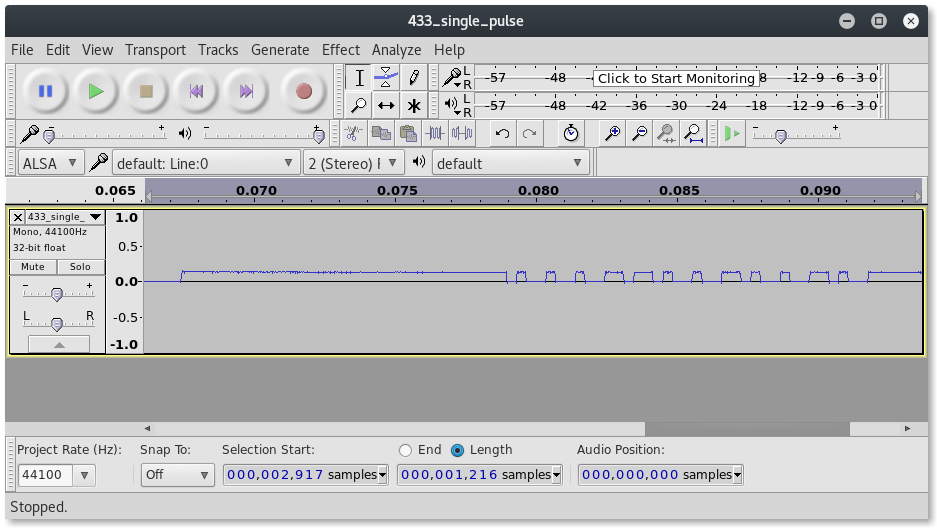
Spotting the key with your eye may be easy in this case, but its a lot harder with longer waves. Anyways, running ooktools wave binary for this recording should output the binary sequence.
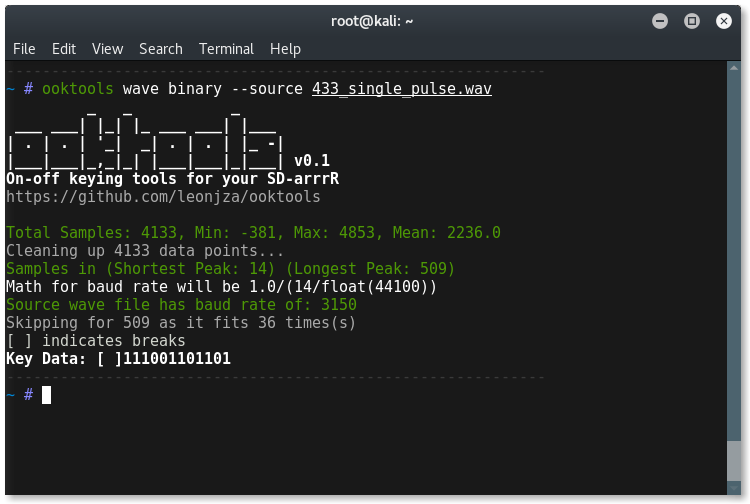
wave clean
The ooktools wave clean command takes a source wave file and tries to ‘square out’ the signal, removing any jumps in the waveform.
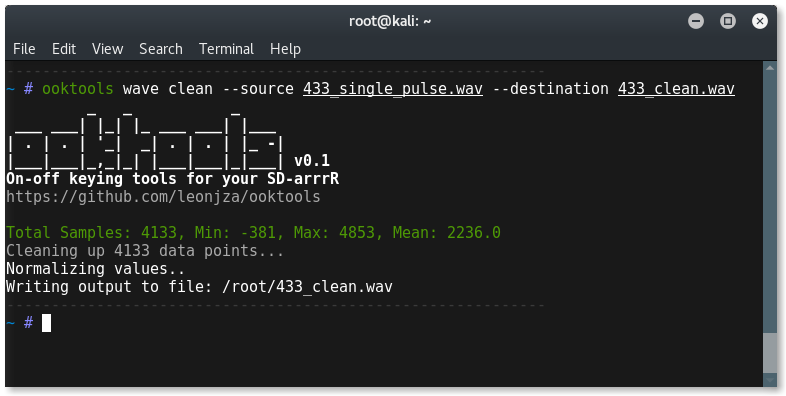
The source and destinations files compared after this command can be seen in this screenshot:
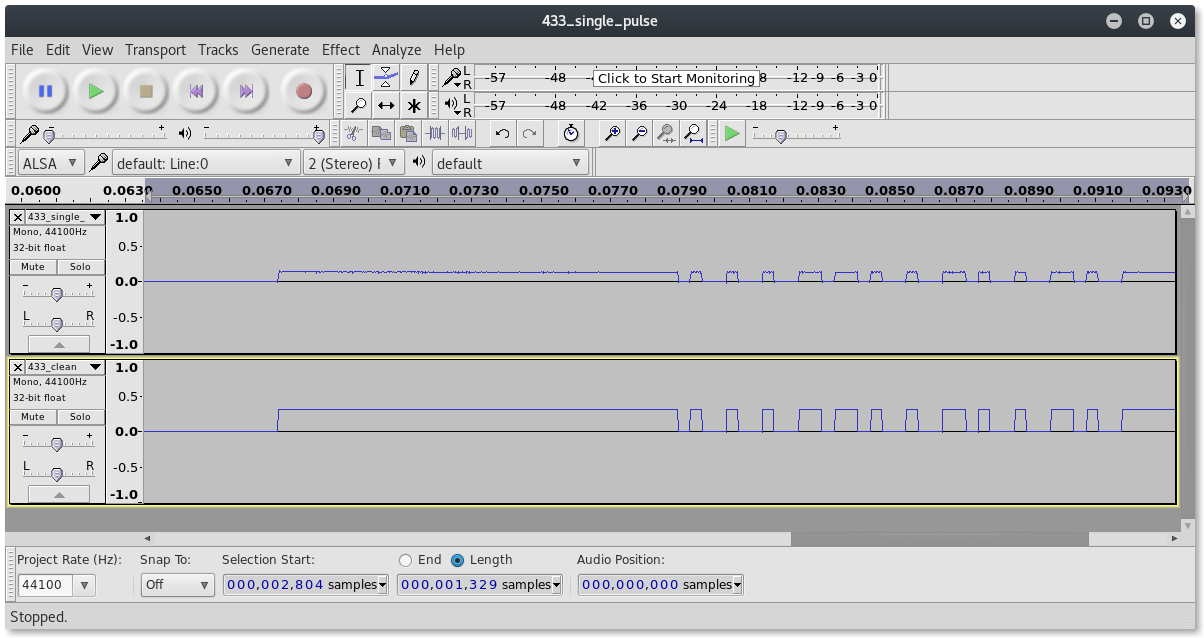
wave graph
The ooktools wave graph command plots the values read from a wave file source. You can interactively pan and zoom the graph to focus on specific areas as needed.
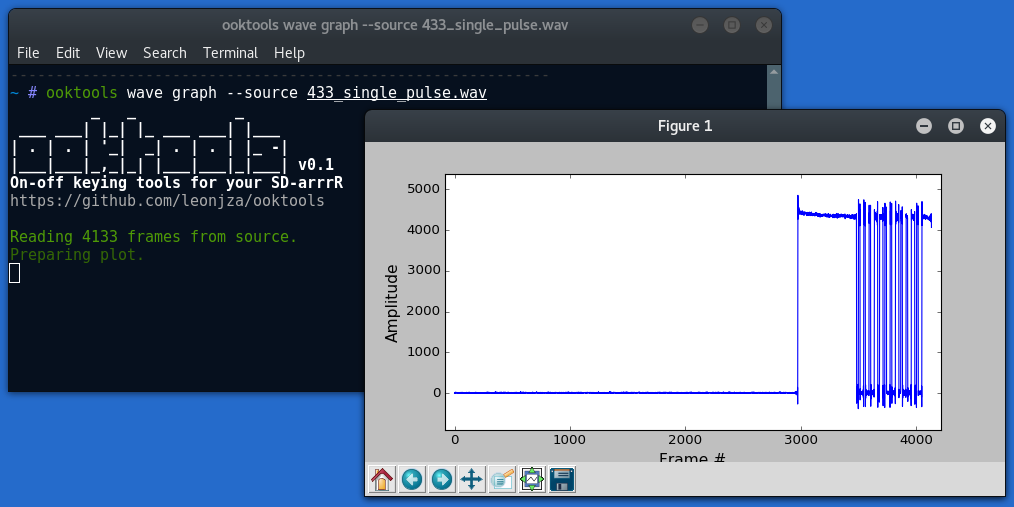
signal search
The ooktools signal search commands attempts to find valid on-off keying packets while iterating over a frequency range that is specified. The definition of a valid packet is currently still a little strange though. :|
To best show this feature, the following asciinema recording attempts to show the signal search in action while I hold down the button on my remote:
signal record
The ooktools signal record command allows you to record a number of frames to a file as you press down on a remote repeatedly. This can then be plotted or simply played back at a later stage.
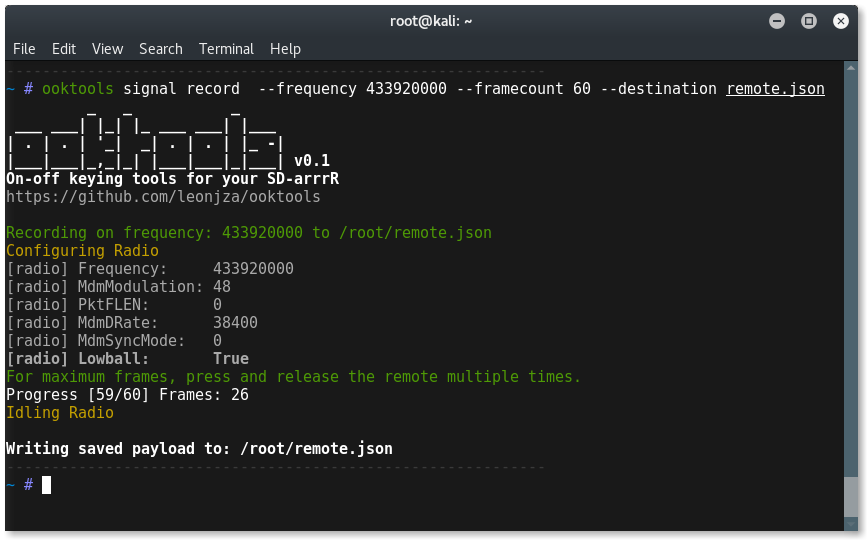
signal play
The ooktools signal play command allows you to replay frames recorded using ooktools signal record. It literally just plays the frames back.
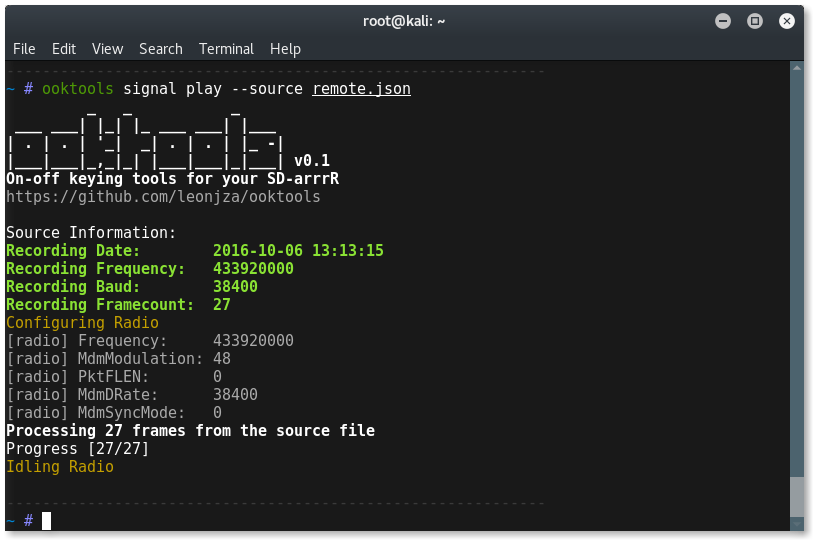
signal plot
The ooktools signal plot command allows you to create plots of the frames that were recorded using ooktools signal record. This could be used to very quickly get an idea of the on-off key that may be present on a remote.
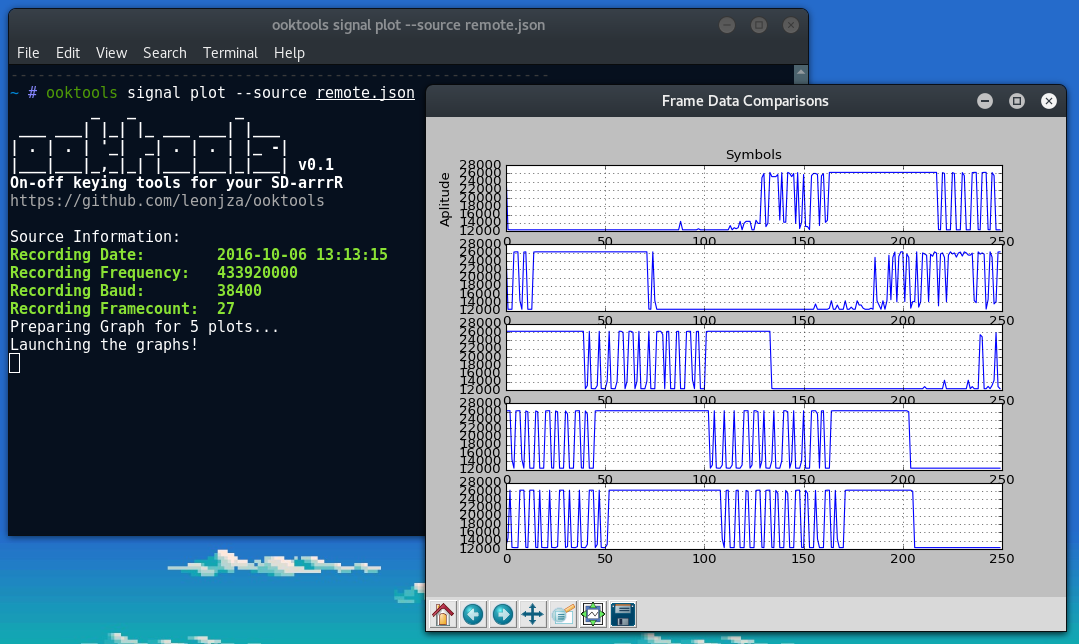
signal send
The ooktools signal send sub command helps with sending signals either as binary codes, full PWM codes or hex strings. Example usage of the binary string method is:
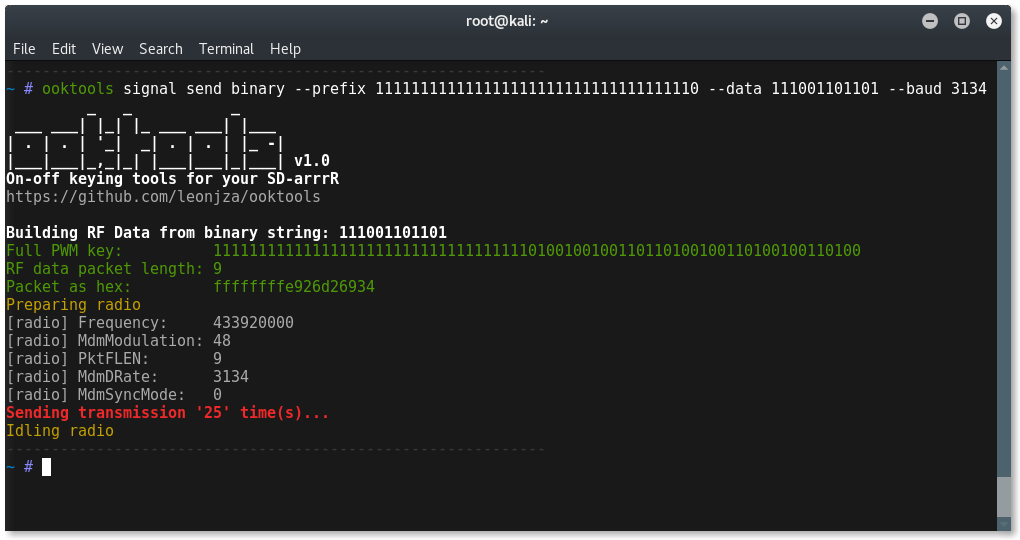
The same code as a hex string would be:
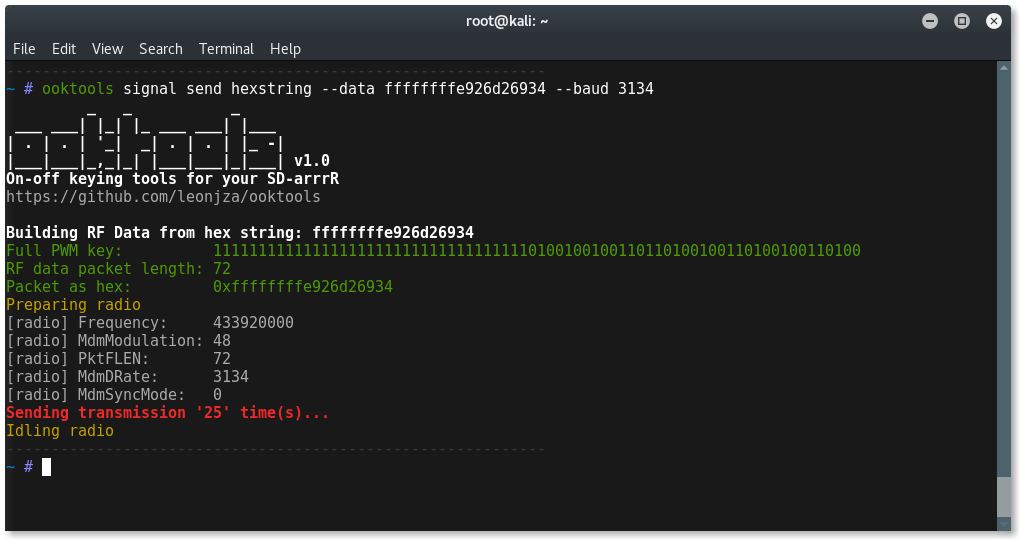
internals and development
I am sure as more time is spent on the toolkit it will evolve and become a little refined. However, if you wish to hack away at it, hopefully the following bit will help in getting you to understand how its put together.
ooktools is build around the excellent python Click cli framework. The applications entry point as defined in setup.py as the cli() method in ooktools.console. This is standard bootstrapping to reach the cli() method. Commands themselves are decorated using the @group.command() decorator and is grouped according to primary function.
Once you checked out the console.py source, you may notice that this file only really handles the commands and arguments to other functions that are defined in ooktools.commands. It is also responsible for calling the correct validation methods as defined in ooktools.validators.
Once a command is happy with its arguments, the actual work is then in the ooktools.commands.category scripts.
As far as dependencies go, at the time of writing ooktools depends on bitstring, click, matplotlib, numpy and peakutils. There is also a requirement for rflib which comes from the RfCat repository.